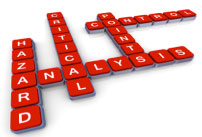FSSC 22000 – Food Safety System Certification
FSSC 22000 started as the ISO 22000 Food Safety Management Standard – however, due to gaps in the prerequisite portion, more work was required before GFSI would designate it a benchmarked international standard. In response, industry stakeholders wrote the Publicly Available Specification (PAS) 220 to shore up the prerequisite aspects in addition to some other requirements. The resultant combination of ISO 22000 and PAS 220 comprise the GFSI-recognized FSSC 22000 Standard. If businesses are already certified to ISO 22000, they only need to be further reviewed against PAS 220 in order to achieve full GFSI-approved certification. The Standard is scalable, and appropriate for a wide range of product sectors. FSSC 22000 was awarded acceptance by the European Cooperation for Accreditation (EA) in October 2010 – this means most accreditation bodies now accept the standard.
 As mentioned, it is helpful to choose a standard that builds on systems you already have in place. FSSC 22000 is a good option, because it is flexible and integrates well with existing systems. On the other hand, it is also very broad in scope and provides a good structure for systems that are essentially unformed and building from the ground up. For instance, FSSC 22000 provides detailed guidance on the investigation and development of a Hazard Analysis Critical Control Point (HACCP) plan, a key formative element of any food safety standard.
As mentioned, it is helpful to choose a standard that builds on systems you already have in place. FSSC 22000 is a good option, because it is flexible and integrates well with existing systems. On the other hand, it is also very broad in scope and provides a good structure for systems that are essentially unformed and building from the ground up. For instance, FSSC 22000 provides detailed guidance on the investigation and development of a Hazard Analysis Critical Control Point (HACCP) plan, a key formative element of any food safety standard.
As with other standards, the certification audit is commenced after the business accepts the proposal from the Certification Body (a preliminary pre-audit may also be conducted at the discretion of the business). FSSC 22000 audits are comprised of 2 stages:
Stage 1 – called the ‘Readiness Review’, looks at the documented system (e.g. completeness of hazard identification, CCP determination and prerequisite programs). This stage informs the planning of the rest of the audit, with an initial examination of key elements of the system, and identification and timely correction of any identified non-conformities.
Stage 2 – looks more directly at how well actual processes reflect the requirements of the standard, through interviews with employees and the examination of records. Pending the successful completion of a technical review covering both stages, a Certification Manager approves the granting of a certificate.
Surveillance audits are conducted at 6 or 12 month intervals. Every three years, a re-certification audit is conducted as an extension of these routine visits.
For more information about this scheme’s attributes visit their website at: www.fssc22000.com/en/.
To have more articles like this emailed to your inbox, become a GFSR Member today!

